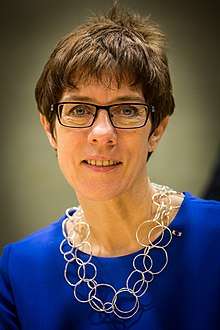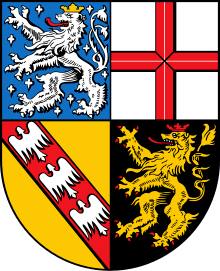Annegret Kramp-Karrenbauer
| Annegret Kramp-Karrenbauer | |
|---|---|
 | |
| General Secretary of the Christian Democratic Union | |
|
Assumed office 26 February 2018 | |
| Leader | Angela Merkel |
| Preceded by | Peter Tauber |
| Minister President of the Saarland | |
|
In office 10 August 2011 – 28 February 2018 | |
| Deputy |
Christoph Hartmann Peter Jacoby (Acting) Heiko Maas Anke Rehlinger |
| Preceded by | Peter Müller |
| Succeeded by | Tobias Hans |
| Leader of the Christian Democratic Union in the Saarland | |
|
Assumed office 28 May 2011 | |
| Preceded by | Peter Müller |
| Minister for Labour, Prevention, Family and Social Affairs of the Saarland | |
|
In office 10 November 2009 – 9 August 2011 | |
| Prime Minister | Peter Müller |
| Preceded by |
Gerhard Vigener (Labour and Social Affairs) Herself (Family and Women) |
| Succeeded by | Monika Bachmann |
| Minister of Education, Culture, Family and Women of the Saarland | |
|
In office 3 September 2007 – 10 November 2009 | |
| Prime Minister | Peter Müller |
| Preceded by |
Klaus Sessler (Education) Herself (Family and Women) |
| Succeeded by |
Klaus Sessler (Education) Karl Rauber (Culture) |
| Minister of the Interior, Family, Women and Sport of the Saarland | |
|
In office 6 October 2004 – 3 September 2007 | |
| Prime Minister | Peter Müller |
| Preceded by |
Herself (Interior and Sport) Regina Görner (Women) |
| Succeeded by | Klaus Meiser |
| Minister of the Interior and Sport of the Saarland | |
|
In office 13 December 2000 – 6 October 2004 | |
| Prime Minister | Peter Müller |
| Preceded by | Klaus Meiser |
| Succeeded by | Herself (Interior, Family, Women and Sport) |
| Member of the Landtag of Saarland | |
|
In office 5 September 1999 – 1 March 2018 | |
| Personal details | |
| Born |
9 August 1962 Völklingen, West Germany (now Germany) |
| Political party | Christian Democratic Union |
| Alma mater |
Saarland University University of Trier |
Annegret Kramp-Karrenbauer (born 9 August 1962), often referred to as AKK,[1] is a German politician serving as General Secretary of the CDU since 2018. She was Minister-President of Saarland from 2011 to 2018[2], making her the first woman to lead the government of Saarland and only the fourth woman to govern a German state.
Early life and education
A headmaster’s daughter,[3] Kramp-Karrenbauer is from a Catholic family. She initially wanted to be a midwife and considered becoming a teacher,[3] but in 1984 began studying political science and law at University of Trier and Saarbrücken, earning a master in political science in 1990.[4] From 1991 to 1998 she served as a policy officer for CDU Saarland, and in 1990 advised Peter Müller in his capacities as head of the CDU parliamentary group in the Landtag of Saarland and as Minister-President.
Political career
In 1998, Kramp-Karrenbauer replaced another lawmaker in the Bundestag for about seven months before losing that seat in the national elections the same year.[3]
Between 2000 and 2004, Kramp-Karrenbauer served as State Minister on Internal Affairs in the government of Minister-President Peter Müller; she was the first woman to hold that office in Germany.[5]
In the negotiations to form a coalition government following the 2009 federal elections, Kramp-Karrenbauer was part of the CDU/CSU delegation in the working group on education and research policy, led by Annette Schavan and Andreas Pinkwart.
Minister President of Saarland, 2011–2018
In January 2011, Kramp-Karrenbauer was named as successor to Müller, who went on to become a judge at the Federal Constitutional Court of Germany.[5]
In January 2012, Kramp-Karrenbauer ended a coalition that included the liberal Free Democratic Party (FDP) and blamed the party for “dismantling itself.”[6] She said that her three-party coalition – including the Greens as well as the FDP and her own CDU – had lost the necessary “trust, stability and capacity to act” with the liberals. Under Kramp-Karrenbauer’s leadership, the CDU won the state election shortly after, in what was widely regarded the first electoral test of Chancellor Angela Merkel’s crisis-fighting policy since the beginning of the European debt crisis;[7] meanwhile, the FDP was ejected from the state parliament after taking just 1.2 percent.[6]
On the national level, Kramp-Karrenbauer also served as Commissioner of the Federal Republic of Germany for Cultural Affairs under the Treaty on Franco-German Cooperation between 2011 and 2014. She continues to be a member of the German-French Friendship Group set up by the German Bundesrat and the French Senate. As one of the state's representatives at the Bundesrat, she serves on the Committee on Cultural Affairs; the Committee on Foreign Affairs; and on the Committee on Defence.
Kramp-Karrenbauer was a CDU delegate to the Federal Convention for the purpose of electing the President of Germany in 2012 and 2017. In the negotiations to form a so-called Grand Coalition (Große Koalition) following the 2013 federal elections, she was part of the CDU/CSU delegation’ leadership team.
Under Kramp-Karrenbauer’s leadership, the CDU won 40.7 percent of the vote in the 2017 state elections, up from 35.2 percent in 2012.[8] On the national level, in the negotiations to form a fourth coalition government under Merkel, she led the working group on education policy, alongside Stefan Müller, Manuela Schwesig and Hubertus Heil.
General Secretary of the CDU, 2018–present
In February 2018, Kramp-Karrenbauer was nominated by Angela Merkel as the new Secretary General of the CDU.[4] In that capacity, she is to manage the party and oversees election campaigns.[9] On 26 February 2018, Kramp-Karrenbauer was elected as General Secretary at the CDU party conference and received 98.87 percent of the delegate votes.[10]
Political positions
Kramp-Karrenbauer is widely perceived as a centrist within the CDU.[4]
When the Mayor of Hamburg Olaf Scholz submitted a motion for a mandatory women's quota for supervisory boards to the Bundesrat in 2012, Kramp-Karrenbauer joined the state governments controlled by the Social Democrats and voted in favor of the draft legislation; in doing so, she supported an initiative opposed by Chancellor Angela Merkel and state governments controlled by the CDU.[11]
Amid her party’s campaign for the 2013 federal elections, Kramp-Karrenbauer suggested Germany return to a top income tax rate above 50 percent, setting off a fierce debate within her party. In her view, Chancellor Angela Merkel's predecessor Gerhard Schröder had gone too far by reducing the top rate to 42 percent from 53 percent in the 1990s.[12] In May 2014, she was among leading members of Merkel’s CDU who called for reductions to offset the fiscal drag – the automatic increases in the tax take that occur as inflation and income growth push wage-earners into higher tax brackets.[13]
When the Federal Constitutional Court ruled in favor of tax equality to same-sex couples in 2013, Kramp-Karrenbauer voiced her concerns about also granting full adoption rights for same-sex couples."[14] In 2015, she caused a public controversy by arguing that "if we open up [the definition of marriage] to become a long-term responsible partnership between two adults, then other demands can't be ruled out, such as a marriage between close relatives or between more than two people."
Other activities
- German Adult Education Association (DVV), President (since 2015)
- Central Committee of German Catholics, Member
- Konrad Adenauer Foundation, Member
- Max Planck Society, Member of the Senate
- Max Planck Institute for Informatics, Member of the Board of Trustees
- RAG-Stiftung, Ex-Officio Member of the Board of Trustees
- Talat Alaiyan Foundation, Patron
- German Foundation of School Sports, former Chairwoman of the Board of Trustees
- Foundation for the Cultural Heritage of Saarland, former Ex-Officio Chairwoman of the Board of Trustees
- 2011 FIFA Women's World Cup, Member of the Board of Trustees[15]
Personal life
Kramp-Karrenbauer is married and has three sons.[16] Her husband Helmut, a mining engineer, stayed home to bring up their children as she pursued her political career.[4] Kramp-Karrenbauer has lived her whole life in Puettlingen.[3]
An avid reader and self-described AC/DC fan,[17] Kramp-Karrenbauer speaks French and continues to take lessons to improve her command of the language.[18]
References
- ↑ Angela Merkel Starts Grooming Successors, and One Stands Out, The New York Times
- ↑ Saarland. "Ministerpräsident - Saarland.de". www.saarland.de.
- 1 2 3 4 Michelle Martin (February 26, 2018), Unassuming "Mini-Merkel" in pole position to succeed German chancellor Reuters.
- 1 2 3 4 Guy Chazan (February 21, 2018), ‘Mini-Merkel’ moves up to Germany’s political big league Financial Times.
- 1 2 Siobhán Dowling (January 25, 2011), Letter from Berlin: Germany's New Generation of Female Political Leaders Der Spiegel.
- 1 2 Anthony Czuczka and Brian Parkin (April 16, 2012), Merkel Seen Turning to Euro Bond-Backing SPD to Win in 2013 Bloomberg News.
- ↑ Anthony Czuczka and Brian Parkin (March 26, 2012), Merkel’s Party Wins Saarland State in Show of Crisis Backing Bloomberg News.
- ↑ Paul Carrel and Hakan Erdem (March 26, 2017), Merkel's conservatives win Saarland vote in boost for national campaign Reuters.
- ↑ Patrick Donahue and Arne Delfs (February 19, 2018), Merkel Sets Up Potential Successor With Key Party Appointment Bloomberg News.
- ↑ Kolb, Barbara Galaktionow, Sebastian Gierke, Matthias; Peters, Benedikt (26 February 2018). "Kramp-Karrenbauer mit großer Mehrheit zur CDU-Generalsekretärin gewählt" – via Sueddeutsche.de.
- ↑ Markus Dettmer, Peter Müller and René Pfister (April 23, 2013), Rebel in the Ranks: Gutsy Minister Gives Glimpse of Life After Merkel Der Spiegel.
- ↑ Noah Barkin (March 24, 2013), Merkel ally backs double-digit hike in top tax rate Reuters.
- ↑ Stefan Wagstyl (May 8, 2014), Angela Merkel sees no ‘room for manoeuvre’ on tax cuts Financial Times.
- ↑ Melanie Amann, Dietmar Hipp and Peter Müller (June 11, 2013), Vater and Vater: Gay Adoption Debate Flusters Conservatives Der Spiegel.
- ↑ WM-Kuratorium unter Vorsitz von Dr. Thomas Bach FIFA, press release of 30 September 2008.
- ↑
- ↑ Leon Mangasarian (May 23, 2013), German SPD Seen by Merkel Party Leader Turning to Left Bloomberg News.
- ↑ Leon Mangasarian (May 23, 2013), Strained Franco-German Ties Worry Merkel Party Saarland Premier Bloomberg News.
External links
![]()
| Party political offices | ||
|---|---|---|
| Preceded by Peter Müller |
Leader of the Christian Democratic Union in the Saarland 2011–present |
Incumbent |
| Preceded by Peter Tauber |
Secretary General of the Christian Democratic Union 2018–present | |
| Political offices | ||
| Preceded by Peter Müller |
Minister-President of the Saarland 2011–2018 |
Succeeded by Tobias Hans |
